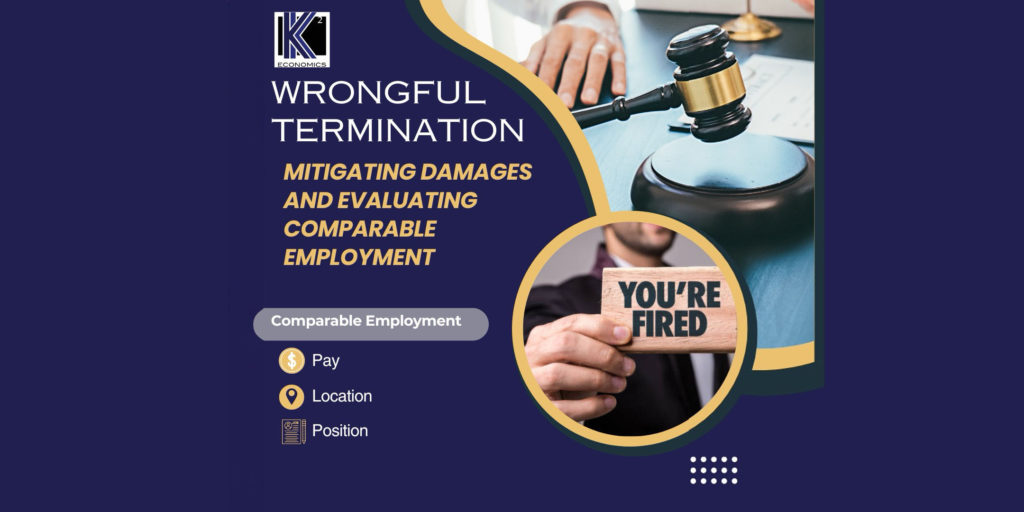In wrongful termination cases in California, economic damages are essential to compensate plaintiffs for the financial losses caused by Defendants. These damages typically include lost wages, benefits, and other forms of compensation that the plaintiff would have received from their employer. A critical aspect of these cases is the plaintiff’s duty to mitigate damages by seeking comparable employment. Determining what constitutes “comparable” employment involves analyzing several factors, including the job’s location, duties, pay, and other relevant aspects.
What is Defined as Comparable Employment?
When assessing whether post-termination employment is comparable, California courts consider multiple factors:
- Location: The geographical location of the new job is crucial. In Villacorta v. Cemex Cement, Inc., the Court recognized that a job requiring relocation might not be deemed comparable if it involves significant lifestyle changes or additional expenses. The distance, cost of relocation, and impact on the plaintiff’s personal life are all taken into account.
- Job Duties: The nature and responsibilities of the new job must be substantially similar to those of the previous position. In Parker v. Twentieth Century-Fox Film Corp., the California Supreme Court held that a plaintiff is not required to accept a position that is significantly different in duties or inferior in status.
- Pay: Compensation is a critical factor in determining comparability. A job with substantially lower pay does not qualify as comparable employment. A plaintiff earnings six figures does not have to take on a minimum wage job as part of his/her efforts to mitigate the loss of earnings. The new position must offer similar salary and benefits to be considered a valid mitigation of damages.
- Job Security and Working Conditions: Comparable employment must also offer similar job security and working conditions. If the new job is more precarious or comes with worse conditions, it may not be considered comparable. Courts consider these elements to ensure that the plaintiff is not forced into an inferior position.
Non-Comparable Employment and Offsets
California law is clear that if a post-termination job is not comparable, it does not need to be considered as an offset against the plaintiff’s lost earnings claim. According to section 3963 of the California Civil Jury Instruction (CACI), comparable employment means that any post-termination employment must be “substantially similar”. This can refer to a broad range of factors such as (a) the nature of the work; (b) whether the new position was substantially inferior; (c) the salary, benefits, and hours; (d) the required similar skills, background, and experience; (e) the job responsibilities; (f) the locality; and (g) [which allows the parties to insert other relevant factor(s)].
This ensures that plaintiffs are fully compensated for their actual losses without being penalized for accepting inferior employment.
Burden of Proof in Mitigation Efforts
In California, the burden of proving that the plaintiff failed to mitigate damages falls on the defendant. According Chyten v. Lawrence & Howell Investments, “The burden is on the employer to prove that substantially similar employment was available which the wrongfully discharged employee could have obtained with reasonable effort.”
The defendant must provide evidence that the plaintiff either did not search for new employment or unreasonably rejected comparable job offers. If the defendant cannot prove this, the court will not reduce the damages awarded to the plaintiff.
Economic damages in wrongful termination cases in California hinge on a thorough analysis of what constitutes comparable employment. Factors such as location, job duties, pay, and working conditions play critical roles in this determination. Importantly, the burden of proof rests on the defendant to demonstrate that the plaintiff did not make reasonable efforts to mitigate damages. However, if the alternative employment is not comparable, it does not need to be considered as an offset, ensuring that plaintiffs are not unfairly penalized for seeking new work under less favorable conditions.

